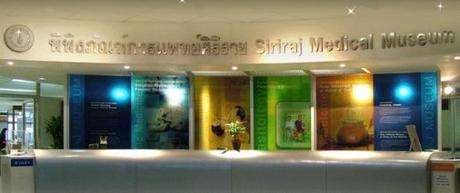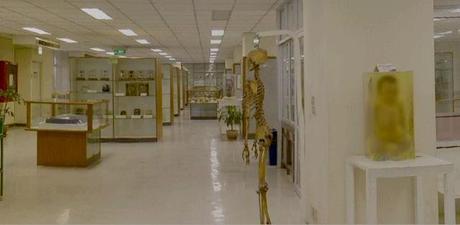
Thanks to Always Restless Feet for today’s trip to the Siriraj Medical Museum in Thailand, quite the adventure…
Siriraj Hospital Houses the Siriraj Medical Museum, which is actually collection of several smaller museums. It is well maintained in a slightly older building. There are many collections of real specimens and dioramas, most of the displays are in Thai, but they are clear enough that you can understand what is on display.
Some of these mini museums qualify as the most gruesome displays in Asia, not to be visited lightly, the others are good enough to take a school group too.
Parasitology Museum
Mainly composed of dioramas and poster style displays of various parasites that can infect people living in Asia. The center of this small museum includes a giant testicle from a suffer elephantiasis.
Prehistory Museum
Dioramas and explanations of hominid evolution and history.
Condon Anatomy Museum
Some interesting items, but mostly overshadowed by the sheer number of still born and Siamese children preserved in jars. Many of these specimens will a small assortment of toy cars, candy and money left at the base by Thai visitors ensuring the ghosts’ of the babies are happy and do not follow them home.
Forensic Museum*
(*Not for young children, the collection includes large number of body parts and people preserved in formaldehyde including car accident and murder victims. ) Damaged organs and photographs of murder and accident cases used in police investigations are on display. This area also contains several preserved bodies of famous serial killers, including Si Ouey, who raped, murdered and ate a number of children before being caught.
History of Thai Medicine Museum
The Ouay Ketusingh Museum of History of Thai Medicine started by Professor Ouay Ketusingh, who headed the Departments of Physiology and Pharmacology, was established in 1979. There is a traditional Thai medicine shop display.

From the website.
Since the 19th Century, Siriraj hospital has been established as the first ‘western’ medical center in the Kingdom of Thailand according to the royal legislation and graciousness of King Rama the V of the Chakri Dynasty. Siriraj hospital is also the first medical college of Thailand to train medical doctors and nurses for more than a century. Several significant contributions in nearly every aspects of medical care and public health with support from large number of Siriraj alumnists have brought trust and respect at national and international levels to this hospital.
During her nearly 120 years as a pioneer in modern medicine not only in Thailand but also Southeast Asia, Siriraj hospital has collectively gathered an enormous compilation of medical equipments and tools, anatomical and clinical specimens including important artifacts and archives relating to the history of medicine in Thailand. Until now, these magnificent collections are separately displayed in 6 different small museums in various pre-clinical and clinical departments.
Professor A.G. Ellis, the first pathologist in Thailand, was an American who came to work at Siriraj under the support of the Rockefeller Foundation from 1919-1921 and 1923-1928. He was also found the first pathological museum in Thailand. At the beginning, the museum was located in “Sala Pathology” (the Pathology Building). The building was completely destroyed in an aerial bombardment during World War II. After the war, the Pathological Museum was re-established by Thai colleagues and named “Ellis Pathological Museum” to honor Professor A.G. Ellis. A variety of exhibits are displayed in this museum including the evolution of pathology in Thailand. On display is a model of the old pathological laboratory at Saowapak Building, Siriraj Hospital. Conduction System of normal heart and heart diseases, fetal development and Congenital anomalies and display types of cancer that often found in men and women. Furthermore, tells treatment and protect. The exhibits are genuine specimens and models.
Location: Siriraj Medical Museum 2 Prannok Road, Bangkoknoi, Bangkok 10700 Thailand
Entry Fee: 40 Baht
